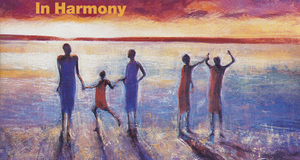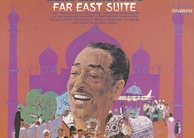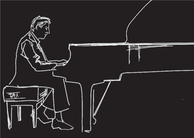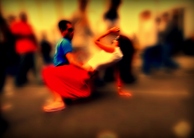Student VoicesPress Play for Politics: The Weapon of a Eurovision Song
By
2015, Vol. 7 No. 10 | pg. 1/1
KEYWORDS:
On the first day of 2010, I got a phone call from the Georgian Public Broadcaster (GPB), the official organizers of Eurovision Song Contest’s Georgian chapter. The Eurovision Song Contest (ESC) is an annual event that attracts some 800 million viewers around the globe—an unprecedented platform that most European nations (particularly the smaller ones like my native Republic of Georgia) embrace with open arms. It’s an opportunity for a spotlight few countries can refuse. In 2009, I had co-written the Icelandic ESC entry, a runner-up that had received the silver prize at the finals held in Moscow. This time, however, impressed with the work I did for Iceland, GPB officials were inviting me to compose a song for my homeland. I was flattered, to say the least, until I heard their caveat to the attractive offer. The chorus lyrics had to contain the following message, word for word—“We will never give in.” This, the GPB representative informed me, was a direct message aimed at the Russian Federation following the August 2008 war between our two neighboring countries. More than write a song which would effectively represent Georgian culture in all of its glory, the GPB wanted me to send a message to Russia, specifically [then] Prime Minister Vladimir Putin. And indeed, this would not be the first time Georgia attempted to deliver such a charged message through the ESC.In my mind, Eurovision had always been an important cultural exchange program—the embodiment of cross-cultural diplomacy with a “showbiz” twist. The ultimate intent of the song festival, to the best of my knowledge, lay in the mission to foster cross-national dialogue, familiarity, and to fight xenophobia. While I faced a choice of publicly mocking Russia—my adopted home for almost a decade—or declining a highly coveted spot in the Eurovision Song Contest, I was, in turn, faced with a larger sociopolitical question: “How could I decline (as I was inclined to do) the invitation on the grounds that overt politics should be excluded from this peaceful event, when this peaceful event is overtly political in its intent?” With a major question encompassing a number of issues nested inside each other like Russian dolls, I embarked on an intellectual journey to unpack my mental matryoshka—the complex marriage of music and politics—in order to understand whether songs of protest and political expression should be tolerated at the Eurovision Song Contest, regardless of how the “product” is eventually presented on the dazzling ESC stage. *** *** *** The Eurovision Song Contest (ESC), little known in the United States, is the Olympics of songwriting, encompassing all of Europe and beyond to geographic and cultural outsiders such as Israel, Jordan, Morocco, and the newcomer of 2015—Australia. Inspired by the popular Italian Sanremo Festival, the Eurovision Song Contest (originally titled The Eurovision Grand Prix) first started in 1956 in the aftermath of World War II as a cultural move towards European unity and peace (Mark Lawson, New Statesman). While over the past decades, the contest has acquired a reputation (particularly in the Western music industry) of a kitsch entertainment show with little musical value, it is worth noting that the ESC has served as a successful platform for international artist debuts, producing the likes of Celine Dion, Julio Iglesias and ABBA. Even though the European Broadcast Union (EBU), the official operator of the ESC, has long adopted a law that bans songs of protest and propaganda, this has not stopped artists and songwriters from using this same platform to get their political messages of judgement across to the global audience of millions (Milana Knezevic, Index of Censorship). Christopher Neil, Grammy-nominated producer and my co-writer on the Icelandic entry in 2009, “Is It True?,” notes that the ESC is a piece of televised entertainment and should be regarded as such. “It was never supposed to, nor should it, reflect political or social realities. A song contest is not meant to be a barometer of tensions between nations or economies.” Tracing back to its inception in 1956, “much of Europe was still miserable, exhausted and broke from World War II, but the ESC was not meant to reflect that world.” On the contrary, the goal of its inception was to distract war-torn nations and introduce peace and harmony through music. But even this seemingly apolitical approach of promoting a peaceful inter-national dialogue echoes a political intent. The very instinct of creating Eurovision to heal the wounds of war-torn European civilians can in itself be seen as a political agenda that stemmed from (and thus reflected) the “political and social realities” of the aftermath of World War II to assuage Europe’s suffering. English journalist Mark Lawson compares the contest to the European Union, and claims that while the EU may have earned greater respect in the music industry, Eurovision has, in turn, achieved more to foster peace and dialogue among European nations (Lawson). Viewing the ESC as a musical microcosm, contrary to Christopher Neil I consider this cultural political shift a reflection of the increasingly political world we live in. Playing politics no longer appears to be left exclusively to politicians, but has instead evolved into an integral part of ordinary man’s day-to-day life. Playing politics no longer appears to be left exclusively to politicians, but has instead evolved into an integral part of ordinary man’s day-to-day life. Unlike Neil, I am doubtful that Eurovision has the choice whether to be or not to be political. If the ESC does, indeed, mirror the current European cultural climate, it is then likely to reflect the sociopolitical and economic tensions of the outside world, unable to escape being influenced by the governing realities of each participating nation. Therefore, I am tempted to interpret this reflection as a sign that underneath it all, everything is political. In his essay “The Sweatshop Sublime,” Bruce Robbins brings up the Cultural Studies formula that “everything is political,” and states that this notion “leaves nothing political in a usefully specifiable sense, and thus has the same practical effect as Thomas Mann’s explicit ideal of the ‘unpolitical man,’ inspired by culture to reject with disgust both mass democracy and political instrumentality as such” (Robbins, p. 12). In Mann’s world, the “unpolitical man” is an “aristocrat of the spirit,” a humanist who, by choice, is able to remain unpolitical (Mann, Reflections of a Nonpolitical Man). An avid opponent of anything political, he rejects the notion of allowing politics to govern his life, thus achieving freedom of existence and expression. But an “unpolitical man” could also emerge in an “unpolitical” setting as an idealist promoting humanism by fighting for fundamental human rights. The controversial Olympics “Black Power Salute” is a clear demonstration of a societal yearning for freedom of existence and expression in a typically “unpolitical” setting. At the summer Olympic Games of 1968, as the United States national anthem played and a global TV audience watched, the winners of the gold and bronze medals, African-American athletes Tommie Smith and John Carlos, each bowed his head and raised a black-gloved fist. Images of their gesture entered the iconography of human rights protest. This caused global outrage, particularly in the United States. But was it really all that outrageous for two Americans to stand up for human rights in their country? One must not be immediately labeled as a “political man,” the antithesis of Mann’s proposed ideal of an “unpolitical man,” for pursuing his inner calling to unite and fight for democracy with the same integrity of the “aristocrat of the spirit.” If we assume that Eurovision, like the Olympics, is a platform for an “unpolitical man,” the contest’s larger mission is to achieve unity of different cultures. But on the same note, how can this unity not possess political qualities? Robbins argues that “[Politics] brings groups together in a common action that will not, cannot perfectly represent the interests of any of them, that will oppose an antagonist each of them will find scandalous for a slightly different reason—will oppose, in effect, a slightly different antagonist” (p. 14). I propose interpreting the Georgian Eurovision song as a signal prompting Europe to demonstrate solidarity by giving 12 (maximum) points to the former Soviet nation, thus championing the song and sympathizing with the country’s external politics, specifically in relation to its tensions with the Russian Federation. Not surprisingly, the American Idol-style voting system of the ESC becomes more telling about how different European countries view each other, instead of serving as a barometer of the continent’s musical tastes. However, what is political can also be highly personal. Author Sheila Whiteley argues that the “musico-poetic” voice is crucial in questioning the powerful status of oppression and subordination (Popular Music and Human Rights). Where the personal ends and the political begins (or vice versa), especially when social issues are on the verge of implying political undertones, is a grey area. This separation appears to be all the more vague in Georgia’s understanding of politics versus pure art, as the two entities evolve into something that in the end becomes far more personal. Reluctant to accept the Georgian Public Broadcaster’s offer on the spot, I decided to ponder on my final decision and further explore the possible repercussions of accepting the offer to promote my homeland’s “musico-poetic” political propaganda. While the ultimate Eurovision goal would be to effectively convey the rich Georgian culture, in GPB’s case, the broadcaster’s primary agenda was to effectively play “soft” politics. In Empire of Song: Europe and Nation in the Eurovision Song Contest, authors Andrea Bohlman & Alexander Rehding, argue that “soft” politics are constantly at play in Eurovision, claiming that “between the national and transnational, political musicians must tread lightly, dancing their way toward their neighbor’s douze [twelve] points” (Bohlman & Rehding, 293). In order to get the maximum 12 points, the ESC participants often appeal to their political allies, at times echoing clear undertones of protest through political propaganda. The year before I was invited to write a Eurovision song for my native country, Georgia made the headlines that quickly spread beyond the song contest by displaying “hard” politics in their pun-tastic 2009 entry, “We Don’t Wanna Put In,” an anti-Putin message that Georgia hoped to perform at the ESC finals held, ironically, in Moscow. Not surprisingly, the EBU immediately banned the entry, urging the composers to either rewrite the lyrics or drop out completely. The Georgian delegation ultimately chose the latter. While the country considered their submission an act of social commentary (acceptable by EBU’s standards), it was the undeniable reference to the Russian Prime Minister that resulted in the committee’s unanimous decision to ban the entry. Christopher Neil argues that verbally attacking a leader of a nation, regardless of his or her politics, is and should remain unacceptable in modern European society. Georgia’s direct aim at Vladimir Putin was, according to Neil, “unethical,” lacking all subtleties of diplomacy. However, to counter this argument, one could view a platform like the Olympics or Eurovision that targets a multi-million audience as an opportunity for a weaker nation to spread their message on a global level. In this context, I propose interpreting Georgia’s “unethical” request to include the lyrics “We will never give in” as a small post-Soviet country’s attempt at patriotism, due to limited outreach resources on a pan-European scale. A global audience of 800 million is an irresistible platform, particularly given the size of the Eurasian nation that could otherwise remain largely unnoticed by the Western world. It is fair to give Georgia the benefit of the doubt for pursuing their patriotic calling, more so than merely mocking a leader of a country that had, less than two years earlier, invaded their territory. However, Christopher Neil rejects this interpretation and instead views Georgia’s decision as less of a patriotic attempt at social commentary and more of an explicit act of protest, particularly in the aftermath of the 2008 Georgia-Russia war. He considers Eurovision to be an “entirely inappropriate platform in which to play politics.” I cautiously digest his comment with a pinch of salt, acutely aware of the fact that these words are coming from a citizen of the United Kingdom, a country that, unlike the small Republic of Georgia, is less hungry for the Eurovision spotlight, and is therefore more protective of his country’s status quo. Music and politics have long co-existed beyond the realms of a TV contest, and Neil’s criticism of using art to “play politics” is a technique that dates back to the great philosophers who had historically encouraged this unity. In some of the very first recorded writings on politics and arts, music is highlighted as a key component of a solid society. In his book on Music and Politics, John Street claims that music has always been “too politically important to be left to the people. For Plato, according to Austin Harrington (2004: 10), the role of art was to enlighten citizens… ‘to the eternal justice sought by statesmen and lawgivers… If this skill was misused, however, as might be the case with music, it could unsettle ‘the most fundamental political and social conventions’ (Republic, 424).” Hypothetically, if Plato were one of the members of the EBU committee, he might have allowed and even encouraged political expression for the sake of enlightenment of pan-European society. The deeper I delved into various contrasting opinions and tendencies for and against political expression in music, the more obvious it became that there is another, potentially more important issue at the far end of this argument. This level of control of political expression, if put into action, holds an inherent threat to evolve into heavy-armed censorship. One could argue that controlling the song content jeopardizes the fundamental right of an individual to “freedom of opinion and expression” depicted in the United Nations Declaration of Human Rights. Contradicting his own argument, Christopher Neil insists that the very notion of “controlling,” or worse still, “suppressing” the universal artistic freedom of expression, an unquestionable human right, would be a “crime against humanity.” He says the very mission of the Eurovision Song Contest is embedded in the name, “expressing your choice of song, not arguing about who should or should not be the leader of a given nation,” as in the case with Georgia’s proclamation that they “Don’t Wanna Put In” [Vladimir Putin]. Neil compares using the Eurovision contest to protest a political act or actor to the absurd analogy of utilizing a Security Council meeting at the United Nations as a showcase platform for a song contest. Ironically, some UN officials might welcome this “musical” format for voicing different nations’ political arguments and resolutions that could add considerable color and excitement to otherwise tense and at times bleak Security Council meetings! *** *** *** After careful consideration, I made a counter-offer to the Georgian Public Broadcaster—a compromise to use a “double-entendre” technique to relay the same message but in a form of a love song. Following my submission of “Never Give In,” which was included in the pre-selection concert and performed live on GPB’s Channel 1 by a Georgian artist, Sofia Nizharadze, the officials voiced their verdict: the lyrical content of the song was considered “insufficiently political for the cause.” Though undeniably disappointed, deep down, I was also secretly relieved. Who knows, had the song gone through to the ESC semi-finals, “Never Give In” may have resulted in yet another disqualification a la “We Don’t Wanna Put In.” Alternatively, had the song reached the finals in its semi-political form, I, as the guilt-ridden creator, may have found myself on the receiving end of the repercussions from Russia, where I had spent my formative years following my family’s emigration from the war-torn Georgia of the ‘90s. Through this process, I reached a subjective conclusion that even if political expression is not entirely banned but is instead carefully screened by both the EBU and each country’s designated broadcast committee, the issue of censorship limiting one’s right to freedom of artistic expression is still problematic. Entirely banning the act of political expression at a song contest equals banning freedom of speech, contradicting the very intent of the Eurovision Song Contest to grant a voice to every European nation. However, the flip-side of offering an unlimited carte-blanche without advanced screening of content leaves the European audience at risk of tuning in for an evening full of protest songs, similar to a Security Council performance with a Euro-pop twist—a battlefield of protesters using a weapon of song. This is likely to alienate the core audience of the popular TV show, as the entertainment factor would swiftly be replaced by a political component, which, in turn, could result in the contest becoming entirely meaningless. While on the outside the respective missions of the ESC and the Republic of Georgia appear to be in contradiction, upon closer inspection, we find that the underlying goal of pursuing peace and harmony is prevalent in both positions but demonstrated in drastically different ways. Contrary to the perception of the majority of East European countries, Eurovision is not a musical Op-Ed that invites participants to promote their political propaganda with little to no regard for the ethical and diplomatic use of language. Ultimately, we cannot ignore the founding mission of Eurovision, whether it be political or not, to showcase the importance of bringing countries together—not splitting them apart—to celebrate diversity, music and culture, instead of criticizing each other’s political leaders and thus burning bridges with next-door neighbors. Hence the upcoming ESC 2015 theme of “Building Bridges” to celebrate the 60th edition of the Eurovision Song Contest. But no matter what, year after year, faced with a weapon of a “catchy” Eurovision pop song, each participant will fight back with their own Euro-anthem for the much coveted grand-prix and “never give in!” ReferencesBohlman, Andrea, and Rehding, Alexander. Empire of Song: Europe and Nation in the Eurovision Song Contest. Edited by Dafni Tragaki. Lanham, Maryland: Scarecrow Press. (2013) Print. Japaridze, Tinatin, Livsey, Billy and Robbins, Ben. “Never Give In.” Perf. Sofia Nizharadze. YouTube. (2010) Web. https://www.youtube.com/watch?v=A8kmtBbi7cg (accessed April 2015) Knezevic, Milana. “Glitz and glamour can’t hide Eurovision’s politics.” Index on Censorship. (2013) Web. http://www.indexoncensorship.org/2013/05/glitz-and-glamour-cant-hide-eurovisions-politics/ (accessed April 2015) Kvachadze, Bibi and Stephane Mgebrishvili. “We Don’t Wanna Put In.” Perf. Stephane & 3G. Eurovision Song Contest. YouTube. (2009) Web. https://www.youtube.com/watch?v=gRXHFMPkcfk (accessed April 2015) Lawson, Mark. “Putin and Cameron, take note: Eurovision has a fine record of predicting geopolitical tensions.” New Statesman. (2014): 55-56 Mann, Thomas. Reflections of a Nonpolitical Man. Translated, with an introduction, by Walter D. Morris. New York, New York: Frederick Ungar Publishing Co. (1983) Print. Neil, Christopher. Interview by Tinatin Japaridze. (April 2015) Plato. The Collected Dialogues of Plato Including the Letters. Pantheon Books. (1961) Print. Robbins, Bruce. “The Sweatshop Sublime.” PMLA. 117 (2002): 84-97. Street, John. Music and Politics. Cambridge: Polity Press (2011) Print. United Nations, The Universal Declaration of Human Rights. (1948) Web. http://www.un.org/en/documents/udhr/ (accessed April 2015) Whiteley, Sheila. Popular Music and Human Rights. Edited by Ian Peddie. United Kingdom: Ashgate Publishing. (2011) Print. Suggested Reading from Inquiries Journal
Inquiries Journal provides undergraduate and graduate students around the world a platform for the wide dissemination of academic work over a range of core disciplines. Representing the work of students from hundreds of institutions around the globe, Inquiries Journal's large database of academic articles is completely free. Learn more | Blog | Submit Latest in Music |


















